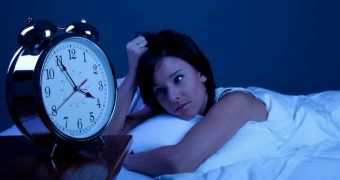Having carried out a series of experiments, a team of researchers led by specialists with the University of Bonn in Germany and King's College London in the United Kingdom have found that sleep deprivation can cause schizophrenia-like symptoms.
In a paper in The Journal of Neuroscience, the researchers explain that, as healthy as an individual might be, staying awake for 24 hours in a row is very likely to greatly alter their brain activity patterns.
More precisely, evidence at hand indicates that sleep deprivation has the potential to foster attention deficit. Besides, hypersensitivity to colors and light, as well as mental leaps and an altered sense of time and smell can occur.
Looking to determine how sleep deprivation affects brain function and perception of reality, the specialists who worked on this research project enlisted the help of 24 healthy volunteers, both men and women, between the ages of 18 and 40.
The volunteers were first allowed to get a good night's sleep and, come morning, had their mental abilities and perception of reality put to the test. One week later, they were kept up all night, and then subjected to another series of tests.
It has thus been discovered that, when not allowed to get any rest whatsoever for 24 hours, the volunteers all displayed symptoms previously documented in the case of individuals diagnosed with schizophrenia, a condition linked to loss of contact with reality, and even hallucinations and delusions.
As already mentioned, the symptoms that these volunteers displayed included increased sensitivity to light, color or brightness, an inaccurate sense of time, and mental leaps. A poor sense of smell coupled with chaotic brain activity patterns could also be seen on the list.
Specifically, the University of Bonn and King's College London researchers who conducted this investigation have found that, as a result of sleep deprivation, the volunteers all lost their ability to properly filter information. Hence, they all experienced sensory overload.
“There were pronounced attention deficits, such as what typically occurs in the case of schizophrenia. The unselected flood of information led to chaos in the brain. We did not expect that the symptoms could be so pronounced after one night spent awake,” says psychologist Ulrich Ettinger.
As explained in The Journal of Neuroscience, the researchers expect that the findings of this investigation could help scientists develop new drugs intended to treat psychosis by using sleep deprivation as a model for their work.
“In drug development, mental disorders like these have been simulated to date in experiments using certain active substances. However, these convey the symptoms of psychoses in only a very limited manner,” researcher Ulrich Ettinger states.
“Sleep deprivation may be a much better model system because the subjective symptoms and the objectively measured filter disorder are far more akin to mental illnesses,” the researchers go on to explain in a press release on the University of Bonn's official website.

 14 DAY TRIAL //
14 DAY TRIAL //